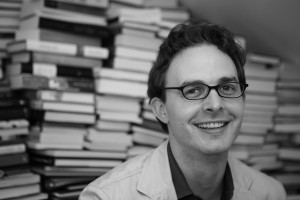 Here in Austin, we’re gearing up for one of our favorite events of the year – the Texas Book Festival (October 22 and 23). I caught up with the festival’s Literary Director, Clay Smith, for his thoughts on this year’s line-up and the role of the festival in the literary community.
Here in Austin, we’re gearing up for one of our favorite events of the year – the Texas Book Festival (October 22 and 23). I caught up with the festival’s Literary Director, Clay Smith, for his thoughts on this year’s line-up and the role of the festival in the literary community.
Q: You will host over 250 authors at this year’s festival. How do you curate two days of panels from a list of authors that long—and who are often very different, to boot?
A: With a lot of help. We have an adult author selection committee and a children’s author selection committee, and they give me and our executive director Heidi Marquez Smith ideas and suggestions and then all of us creatively brainstorm together. We program for a diversity of tastes – from Lit Crawl on Austin’s East Side, which we’re doing with American Short Fiction, to learning how to make puppets in the Children’s Activity Tent with Sesame Street puppeteer Noel MacNeal to hard-hitting political and social issue books covered live by C-SPAN. I’ve learned to think broadly, and to program both my interests and outside of my interests, to create the Festival lineup.
Q: Every publisher in the industry is creating and evolving their digital strategies. Has the rise of technology affected the book festival?
A: It has. We were proud last year to be the first book festival to have a free iPhone app that provides the Festival schedule, in addition to other details. This year, Google Books is sponsoring a Technology Tent at the Festival. Because our audience likes to buy traditional books and get them signed at the Festival, e-books haven’t cut into our sales, but it’s a top priority for us to adapt with the exciting changes technology is inducing in our industry. Our new app will be ready in early October.
Q: What, in your opinion, is the role of the festival in the literary community – both those in the publishing industry, and the readers they serve?
A: All of us around here think that a good Festival is actually like a good bookstore, in the sense that we curate and choose the best writers and put a spotlight on them for readers. It can be daunting for a reader to choose from among so many books published just in this year alone (we only feature books published in the past calendar year), so a good festival brings the best writers to readers and it also creates a community of readers, even if that community is on the Festival grounds just for 48 hours. A festival can also put a spotlight on new writers I think better than the average bookstore can – sending a new writer to a bookstore event may not get a good crowd for that writer, but an established festival will probably do a better job of introducing that writer to new readers.
Q: You spent part of your career in New York, the center of the book world, and have since moved to an outpost. To what degree does this distance give you a different perspective on what’s happening in the industry?
A: I think I get a little less caught up in the understandable anxiety happening in our industry right now about e-readers and technology in general – that’s partly because I don’t work at a publishing house and also because my focus is on producing a good show and not worrying about how much readers are paying for ebooks vs. traditional books. I also am more interested in books about the West and the South than many people in publishing I know.
Q: One could view the book festival as a microcosm of the book marketplace, in that it brings some of the best authors of the year under one roof. Did you notice certain topics or categories of books that seemed to trend this year, in terms of attendance and book sales? To what extent – if at all – do you think that’s a reflection of what’s going on in the industry?
A: Lots of great mystery and thrillers this year – really excited about that. I also love what’s happening in literary fiction – there are so many writers not just flirting with the traditional boundaries of literary fiction but really creatively tearing those boundaries down by writing work that can be considered both literary and genre fiction – Lev Grossman, Charles Yu, Colson Whitehead, Hillary Jordan, and Erin Morgenstern are all blurring the lines, and those of us at the Festival think that’s pretty great.
Check back with us on Wednesday for a preview of this year’s Texas Book Festival and tips on what not to miss.